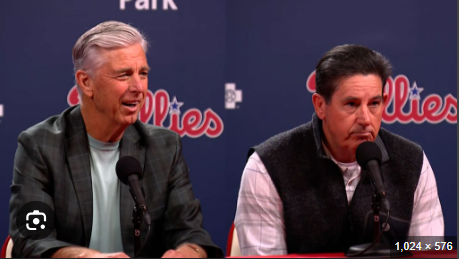
As the 2025 MLB season approaches, the Philadelphia Phillies have revealed critical strategic insights about their pitching rotation, specifically regarding veteran pitcher Taijuan Walker. The Phillies, fresh off another competitive season, find themselves navigating crucial decisions that will shape their roster for the upcoming year. Walker, now 32 years old, has been a key figure in the Phillies’ rotation, but with younger arms emerging and the team eyeing long-term sustainability, the question of Walker’s role has become a focal point of the offseason.
A Key Executive Decision
According to team insiders, the Phillies’ front office has been deliberating extensively about Walker’s future. After signing a lucrative four-year, $72 million contract in December 2022, Walker was expected to be a linchpin in the rotation. However, the 2024 season was a mixed bag for the veteran, as he posted respectable but unspectacular numbers. While he managed to stay healthy and log innings, Walker’s consistency wavered, and the team had to rely heavily on their emerging talent to carry them through key stretches.
Phillies executives, led by President of Baseball Operations Dave Dombrowski, reportedly decided that Walker will remain in the starting rotation but could see his role evolve. This decision balances the need for veteran stability with the team’s desire to develop younger pitchers. With top prospects like Andrew Painter and Mick Abel knocking on the door of the big leagues, the Phillies are looking to be more flexible with their rotation options in 2025.
Walker’s 2024 Season: A Mixed Performance
Walker’s 2024 campaign was not without its challenges. After a solid first half of the season, his ERA hovered around the high 3.00s to low 4.00s, which, while serviceable, was not quite the ace-level production the Phillies might have hoped for when they signed him. His strikeout rate dipped, and there were occasional bouts with control issues that led to shorter outings. Still, Walker proved to be a durable arm, making all of his scheduled starts and providing much-needed innings for a Phillies team that battled injuries throughout their rotation.
The veteran’s experience was particularly valuable in the postseason, where he came through in key moments. Though the Phillies fell short of their ultimate goal, Walker’s playoff poise reaffirmed his place as a valuable asset in pressure situations. This playoff performance reportedly influenced the front office’s decision to keep Walker in the rotation for 2025, even if his regular-season output wasn’t always consistent.
The Rise of Younger Arms
The Phillies’ decision to keep Walker in the starting rotation comes amid a youth movement within the organization. Both Andrew Painter and Mick Abel are expected to be serious contenders for full-time rotation spots by 2025, adding a layer of intrigue to how the team will manage its pitching staff. Painter, the highly-touted right-hander, is viewed as a future ace, and his development is one of the key storylines heading into spring training. Abel, another top prospect, has shown flashes of brilliance, and the Phillies are eager to give him more opportunities at the major league level.
By keeping Walker in the rotation, the Phillies are likely aiming to provide a veteran presence that can help ease the transition for their younger pitchers. This approach allows the team to blend experience with youth, reducing the pressure on Painter and Abel while still maintaining a competitive edge.
Potential Role Adjustments for Walker
Though Walker will remain a starter, sources close to the Phillies’ front office have hinted that his role could become more fluid. There’s speculation that Walker may not be guaranteed a spot in the top half of the rotation. Instead, he could find himself in a more flexible role, depending on the performance of the younger arms.
One potential scenario that has been discussed is a six-man rotation, which would allow the Phillies to manage workloads more effectively, especially for Painter and Abel. A six-man rotation could benefit Walker as well, as it would give him extra rest between starts, something that could help him maintain effectiveness as he enters his mid-30s. Additionally, there’s a possibility that Walker could be used in a swingman role, making spot starts or long relief appearances if necessary.
Walker’s Perspective
From Walker’s standpoint, the upcoming season presents both a challenge and an opportunity. At 32, he’s entering a phase of his career where many pitchers must adjust their approach to maintain effectiveness. Walker has reportedly been working on refining his pitch mix this offseason, aiming to rely more on his secondary pitches to generate softer contact. If he can make these adjustments successfully, there’s no reason why he couldn’t continue to be a productive member of the Phillies’ staff.
Walker’s veteran status and playoff experience will be invaluable as the Phillies aim for another deep postseason run in 2025. His ability to mentor younger pitchers like Painter and Abel could also solidify his importance to the team, even if his role evolves.
Conclusion
The Philadelphia Phillies’ decision to keep Taijuan Walker in their starting rotation for 2025 highlights the delicate balance teams must strike between developing young talent and relying on seasoned veterans. While Walker may not be the ace of the staff, his experience, durability, and playoff performance make him an asset as the Phillies transition into a new era of pitching.
As spring training approaches, all eyes will be on how Walker adapts to any potential changes in his role, and whether he can help the Phillies maintain their status as one of the National League’s top contenders.

Leave a Reply